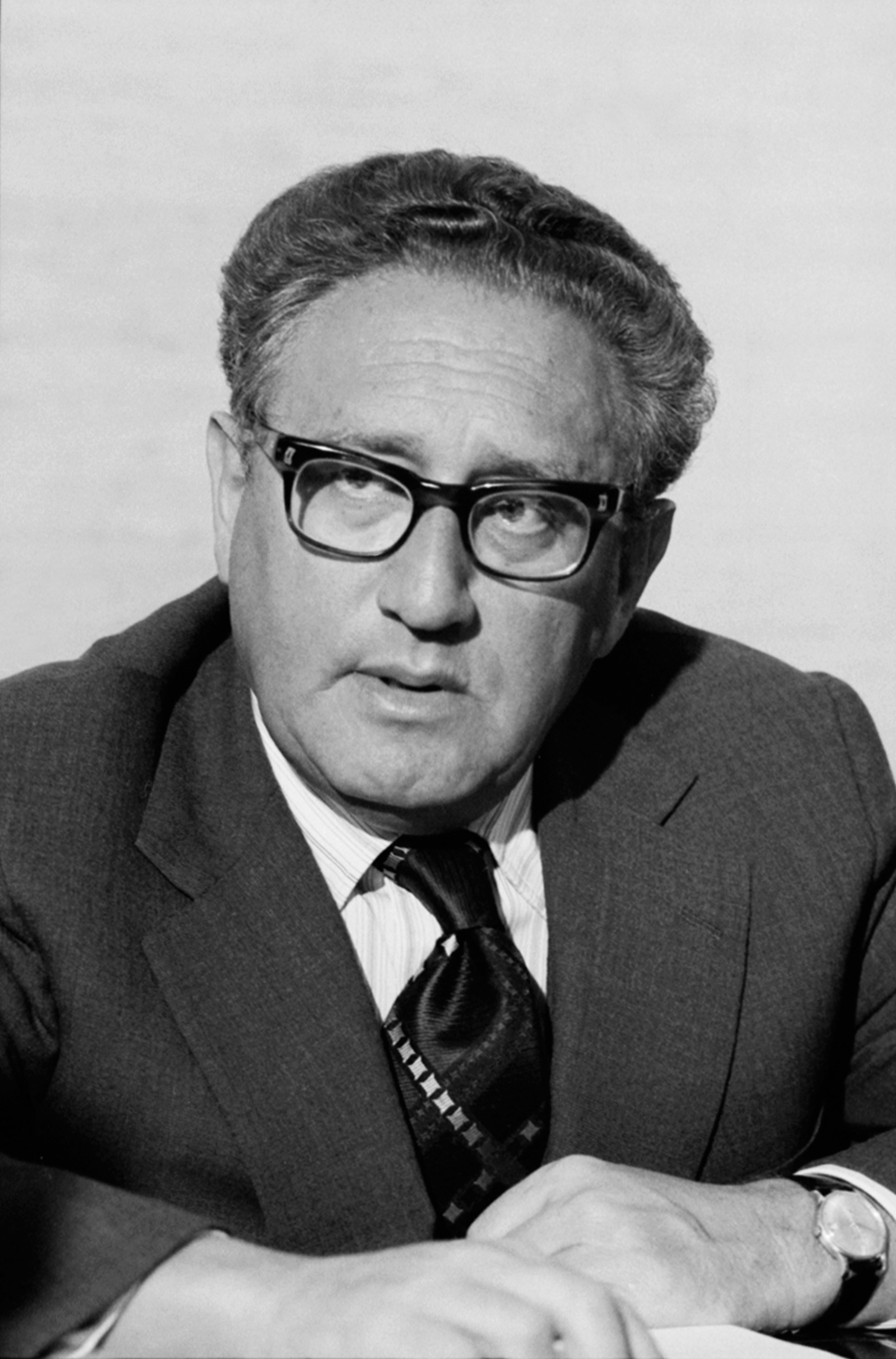Henry Alfred Kissinger,[n. 1] nacido Heinz Alfred Kissinger , es un político estadounidense de origen alemán que tuvo una gran influencia sobre la política internacional, no solo de Estados Unidos con respecto a los demás países sino también sobre otras naciones. Ejerció como secretario de Estado durante los mandatos de Richard Nixon y Gerald Ford, desempeñando este papel preponderante en la política exterior de Estados Unidos entre 1969 y 1977 y fue consejero de Seguridad Nacional durante todo el mandato inicial del primero.
Kissinger se caracterizó por llevar las riendas de un proceder internacional fuerte pero al mismo tiempo negociador, siendo el artífice de la denominada «política de distensión» con la Unión Soviética y China, país con el cual logró, durante el mandato de Richard Nixon, consolidar relaciones pacíficas.
Tuvo que hacerse cargo de poner fin a la muy criticada Guerra de Vietnam y gestionar la crisis de la Guerra de Yom Kippur, concibiendo una nueva visión de como llevar la política exterior estadounidense, al colocar como último recurso la intervención militar, siendo este nuevo proceder el que lo llevó a obtener el Premio Nobel de la Paz en 1973, gracias al alto al fuego que logró establecer en Vietnam.
Aun así, la controversia ha persistido sobre su figura, debido a la intervención de la CIA en varios Golpes de Estado sucedidos en Latinoamérica durante la década de 1970. Sus críticos lo consideran instigador de genocidios sistemáticos de grupos políticos,[1][2][3][4] estando ligado a varios regímenes totalitarios latinoamericanos, tales como la dictadura militar chilena de Augusto Pinochet o el Proceso de Reorganización Nacional de Argentina, así como por ser el responsable de planes represivos como lo sería la Operación Cóndor, cuya célula de origen habría sido la Escuela de las Américas. Todo esto ha ocasionado que existan numerosas iniciativas que persiguen conseguir su procesamiento ante instancias judiciales internacionales, así como la retirada de su Premio Nobel.
Ha pasado a actuar desde el sector privado, fundó la Kissinger Associates, y es accionista y cofundador de la Kissinger & McLarty Associates, así como miembro de las juntas directivas y asesor de las empresas The Hollinger Group y Gulfstream Aerospace. Además es rector de la Universidad de Georgetown y sirvió en Indonesia como Asesor General de Gobierno.
En el 2001, Kissinger fue llamado por el gabinete de George W. Bush para liderar un comité de crisis internacional a causa de los ataques del 11-S así como para que a través de su firma prestase asesoría diplomática y política al gobierno, no obstante Kissinger se retiró poco después de este proyecto.
Henry Kissinger es por mucho una de las figuras políticas y de la diplomacia más relevantes de la Historia de los Estados Unidos, tanto como controvertida. Si bien sus méritos en la política internacional son notables , su negativa a devolver el Premio Nobel de la Paz que recibió gracias al alto al fuego que hubo en la Guerra de Vietnam y que posteriormente se rompió, así como las decenas de acusaciones de colaborar e incluso promover regímenes dictatoriales y acciones terroristas en diferentes partes del mundo, que cometieron severas violaciones a los Derechos Humanos, han ocasionado que su persona haya sido duramente criticada desde numerosas entidades tanto como por personalidades de la política o intelectuales, siendo algunos de los más conocidos el juez español Baltasar Garzón, asesor del Tribunal de la Haya, quien intentó fallidamente procesarlo por violaciones a los Derechos Humanos, y el periodista y escritor Christopher Hitchens, autor del best-seller Juicio a Kissinger.
Henry Kissinger también ha recibido críticas por ser uno de los miembros fundadores y todavía activo, del polémico Grupo Bilderberg, entidad no gubernamental, en la que se reúnen varias de las personas más poderosas e influyentes de todo el mundo, incluyendo monarcas, aristócratas, políticos, empresarios y magnates.[5]
Wikipedia
✵
27. mayo 1923 – 29. noviembre 2023
•
Otros nombres
Henry A. Kissinger
